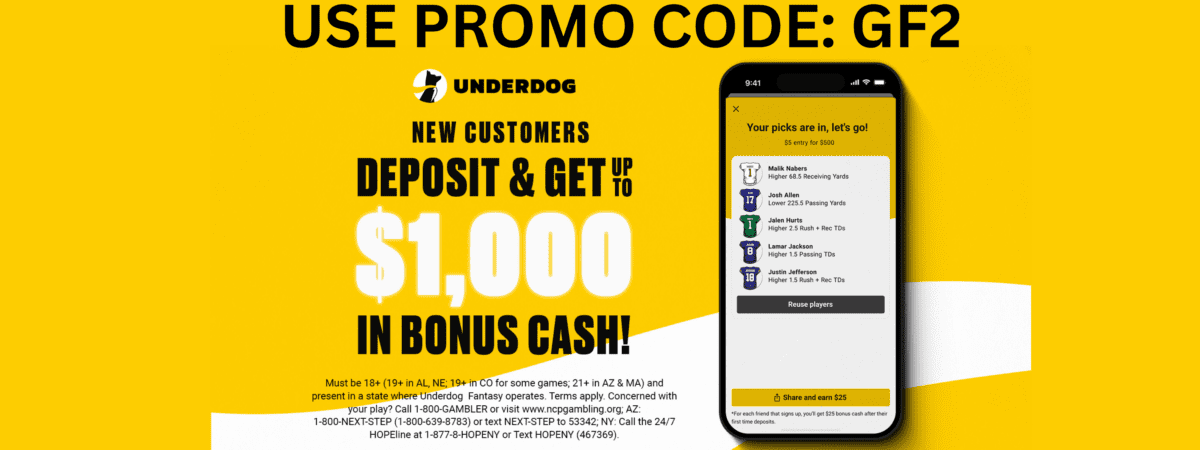My Ten Commandments of Dynasty Fantasy Football Trading
Another NFL season is upon us, or, as it is often called in dynasty circles, “points-scoring season” (as in, “There is no such thing as an offseason!”). This means that even those dynasty league mates who were (unfortunately) relatively disengaged in recent months are (hopefully) once again paying attention, and the trade action in your leagues should pick up in many cases. I thought it might be a good time to discuss some of my “commandments” for dynasty fantasy football trading especially since, among those who know me, I am somewhat known for having strong feelings about this topic.
In several spaces such as podcasts, group chats, and (somewhat notoriously, unfortunately) DMs, I’ve been known to get sanctimonious and soapbox-y about dynasty fantasy football trading and the etiquette involved therein. I will fully admit I can get a little “extra” about this stuff (and there are certain conditions I have that contribute to that, but that’s a whole other article), but at the core of the noise are some helpful (I think, at least) guidelines. So let’s have some fun with my quirks and pet peeves, and maybe flesh out some tips for our dynasty fantasy football trading in the process
General disclaimer: One of my biggest pet peeves – even bigger than the trade ones – is that there are so many ideas and takes in fantasy football presented as absolutes. I don’t really subscribe to many absolutes. Therefore, some of these commandments have exceptions. I am a strong believer in the idea that everything in fantasy football (especially in dynasty, and especially in dynasty trading) is, at least to a significant degree, context-specific, and that applies to so-called commandments, too.
1. Thou shalt not send bad first offers.
This one might just be an absolute, though. Obviously, “bad” can be subjective in many cases, but for me, there is no greater turn-off than a trash first offer. At that point, I think either A. you are not serious or think I’m a fool, or B. are intentionally lowballing me. Either way, it’s a conversation ender instead of a starter. I don’t counter and I think less of you, and you inch towards the “red light” list of people I won’t bother trying to trade with. I’ve even been known to respond harshly (something I might need to work on). I understand the counter-arguments like, “Why would someone potentially overpay if they can get pieces for less? Maybe you value the pieces differently,” and of course. “You lose out on opportunities by shutting things down and red-lighting people.” I’m not dismissing those notions, but relationships are important to dynasty fantasy football trading, so if you’re the manager who has the reputation for offering stinkers, you hurt your chances of making future trades.

2. Thou shalt not say “gotta start somewhere,” “had to try,” or”‘shoot my shot.”
These are common responses when I cite someone violating the first commandment. If a bad first offer irritates me, these responses only make it worse. This is doubling down on clownery. Yes, of course, we have to start somewhere, but somewhere doesn’t have to be in an alternate universe. Similarly, no, you in fact did not have to try that. You could have tried something more serious and realistic. Perhaps the worst is “shooters shoot,” or some form of “shoot my shot.” Besides doubling down on clownery, this adds an almost childish aspect to the interaction – a reckless, “whatever” mindset. This is a ticket on the express train to the aforementioned “red light” list. Like many dynasty managers, I am in a number of leagues and have a busy “real life.” Waste my time with a trash offer? Frustrating. Waste my time with. a trash offer and then give these responses? You’re cut off.

3. Thou shalt practice reciprocity.
In short, don’t ignore your trade partner’s needs. Send an offer that helps them. Send an offer that shows you took a few minutes to look at their roster and picks. You may send a “fair” offer (or even a slight overpay), but if it doesn’t fit what your trade partner wants to do if it does not make sense for their team, why would they accept it? If the team you’re trading with is deep at WR but has a hole at RB, don’t make a WR the centerpiece of your offer and ignore their needs.
There are some folks who might accept it if they are confident they can flip what you’re sending, but that puts the extra work, the extra step, on them. Since I am very busy outside of my fantasy football activity, and since I rarely bank on being able to make that next trade, I’m not a manager who would accept something like that.
Make an offer that shows you’re paying attention. Otherwise, I have little reason to engage with you.

4. Thou shalt not ask “what do you want for…” or “what is the price on…”
For one thing, you’re the buyer – make an offer. If you want something I have, you do the work. I don’t mind someone asking about general parameters for a deal – like am I looking for youth, picks, a certain position, a 2-for-1, etc. – but the best next step is to send an offer. You may get a set price tag when you buy items at the grocery store, but dynasty fantasy football trading is different.
Additionally (and I may be in the minority here), I don’t really have a set price in my head for players, like “two 2nds,” or “a solid RB2,” etc. My ask is dependent on the assets my trade partner has. The general value (to the degree that is neatly discernible) will be similar among the asks, but I don’t have easy answers for price questions. Make an offer.

5. Thou shalt not expect a counter on every offer.
Not every offer gets a counter. Some offers are simply not worthy of counters for me (see commandment 1). If I think your offer is unserious, or if we are clearly very far apart just from looking at the offer, I will not waste my time countering. In other cases, I just might not see a good counter. I might not see the right combo; I might not see a good fit for my goals. In those cases, I will not send a counteroffer.
One way, though, to prevent someone from responding to a rejection with “counter?” or “no counter?” is to respond to as many offers you decline as possible. (see the next commandment)
Love our content? Check out the GoingFor2 Live Podcast Network!

6. Thou shalt not decline serious offers without a response.
This is a commandment I will get pushback on. The “decline and move on” crowd that says I overreact to bad offers often say “decline and move on” when I discuss this commandment. I understand where they are coming from, but I’ve moved on to this issue. I used to be firmly on Team I Don’t Owe You a Response When I Decline a Trade, then moved to Team But It’s a Nice Thing To Do, and now I’m on Team It’s Courteous and Actually Useful.
Obviously, there are exceptions and limitations. I qualified this commandment already with “serious.” Terrible offers don’t deserve a response, or at least not a very polite one. (see Commandment #1) Also, if you’re like me, you may not always have the time to respond. But to be clear, I’m not asking folks to send a dissertation. A simple “We’re kind of far apart,” or “not what I’m looking to do atm,” or “I don’t think he’s worth a 1st” will suffice.
Not only is that just courteous, but it can actually lead to a deal getting done. Some readers will suggest I miss out on opportunities with my stance on Commandment 1, but I suggest I gain more opportunities by responding to almost all offers, even if I don’t counter at first. I’ve gotten trades made that way, and more trades than I made by not red-lighting people I just don’t click with. For me, it’s also been a case of drilling down with interested parties being more effective than spraying a buckshot of offers in a given league. I encourage you to try following this commandment and seeing where it leads.

7. Thou shalt not “neg” the players you are trying to acquire.
The practice of “negging” first came on my radar years ago as a cringey method straight men were using to pick up women. The idea is you slightly talk negatively about the person and the “intriguing disinterest” and potential ding to self-confidence makes them “more vulnerable to your advances.” More recently, as Rick Sanchez points out [warning: explicit language], “Before what you’re trying to do was called ‘negging,’ it was called reverse psychology. And incels didn’t invent it; Bugs Bunny did.”
In dynasty fantasy football trading, negging is your trade partner criticizing players they are trying to acquire. You might get a mild, polite neg such as “____ has been losing value lately, so I was putting him in that range of players, too,” or “Oh, I just assumed you didn’t see him as that type of player.” It might get a little more overt, like, “I don’t think you can get more than that for a guy like him.” In many cases, the other person is subtly trying to plant seeds of doubt about your valuation of the player.
But the worst type of negging is the trade partner scorn by rejection or by your comments, who comes back with, “Fine, then. Good luck trading an undersized, 27-year-old running back.” This is not subtle nor effective. This just gets a response like “Then why are you trying to trade for him?”
Good faith, transparent disagreement about the assessment of a player in the course of good faith, transparent negotiations are one thing, negging is quite another. Don’t neg.

8. Thou shalt not be the trade calculator person.
Some dynasty managers absolutely hate calculators. I don’t. It’s a reference, a data point. For new managers, it can be a useful guide. What I don’t like is to be quoted a calculator – or even worse yet, be sent a screenshot of one. It’s hard to explain, really, but it’s just a poor reflection of you and very off=putting and unbecoming. Don’t do it.
One broad explanation, though, is that in the end, there are humans making the judgments that go into the calculator values for the players and picks. Their assessment may differ from your trade partner’s just like your own could. Another broad explanation is calculators, much like point values and power rankings in dynasty portfolios, analytics, spreadsheets, and trade charts, can give some people the illusion that there is some semblance of exact-ness to all this. They give the illusion that fantasy football (and even more egregiously, dynasty) is more science than art. They do not account for the human element in what we do.

9. Thou shalt not make private offers public.
This is just Bush League stuff. I guess I’m old (school), but it used to be an unwritten rule (and an important one) that you don’t make private trade negotiations public. You don’t talk about who offered you what or speak to a league mate about their offer in a public way. Things seemed to have changed, especially with the emergence of Sleeper. The league chats in some of my leagues are looser, and the Sleeper clientele seems younger, and, well, I have other adjectives for them but we’ll skip that for now. I’ve even seen managers post screenshots of offers in the league chat, which is egregious. By the way, this goes for publicizing DMs, too.
It’s pretty simple here, and I’m disappointed I even have to list this as a commandment. You don’t divulge others’ private stuff – and by the way, your own approach and valuations, too. Stop this nonsense. Put down the Monster energy drink and Axe body spray, pause your Call of Duty online session and play fantasy like an adult. Also, get off my lawn.

10. Thou shalt remember that winning championships beats winning trades.
Part of this commandment goes back to my assertion about relationships being important to dynasty fantasy football trading. If you’re the league mate who is chincy, or who is always trying to squeeze every last bit out of a trade, you risk people (I know me, for one) not coming to you because you’re difficult to deal with.
Another aspect of this commandment refers to the day traders out there. Many base everything on cold, supposedly empirical value and are constantly churning their roster in the name of “plus EV,” and “ROI” and other similar concepts that smell of making this a science, which I referred to in Commandment 8. It also treats dynasty fantasy football trading as a literal stock market. I’m not saying those people don’t have fun or don’t win. I’m saying: 1. at that point, for me, I would just rather take my buy-ins and throw them in a day trading program with heat maps and triggers and not bother with fantasy football, and 2. this approach refuses to “lose” a trade to make a team better, which can be counterproductive.
Sometimes it’s OK to “lose” a trade if it fits your team’s needs, especially if you are trying to compete that season. Winning championships and the money that comes with that is the point of all this. Sometimes you’ll “overpay” or go “all-in” because, in the end, the number one commandment of all of fantasy football is: Thous Shalt Have Fun. When a league ceases to be fun (and for me, repeated “violations” of these commandments will make that happen), it will be one I don’t pay much attention to and/or simply leave. If it’s not fun, there is very little attraction to it or incentive to engage with it.


So there you have it. My dynasty trading pet peeves have been proclaimed, and I will step down from my soapbox for now. Let me know what you think on Twitter at @ffjunkie_ and be sure to tune in to Dynasty Saturday Night Five live at 7:30 PM ET every week (Saturdays, in case that wasn’t clear) for more dynasty takes and general fun.
ATTN Dynasty Commissioners: Do you want to do something cool for your league? How about a 1-hour live show dedicated to YOUR league? Team-by-team breakdowns, rankings, and more. For details and to book a show, visit: GoingFor2.com/plp.






